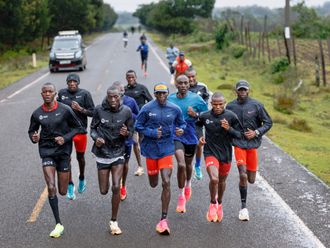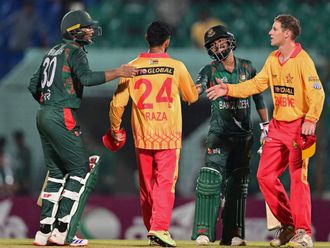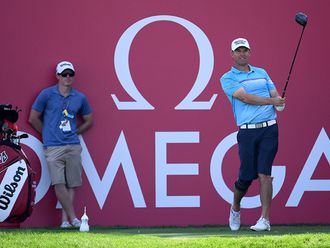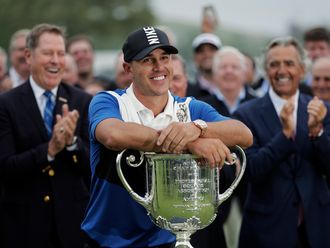Dubai: Hashim Khan was a barefooted ball-boy from Peshawar who toppled class and racial divides to win seven world squash championships in the 1950s. But to Dubai-based squash coach Asif Khan, he will always be a ‘great’ uncle.
The brother of Asif’s grandmother died last week of congestive heart failure at his home in Aurora, Colorado. He was believed to be 100 years old.
From returning balls to British officers, he went on to beat the colonialists at their own game and backyard at the British Open, which, in the days before the game turned professional, stood as a de facto world championship. His running battles with Abdul Bari of India –
with whom Pakistan had just suffered a bloody partition after the end of British rule in 1947 – also enhanced his legend.
He was arguably the first person to put newly formed Pakistan on the map, and the forefather of a Khan dynasty, which went on to win 27 world titles.
Hashim, his cousin Roshan, brother Azam and nephew Mohibullah – Asif’s uncle – won 13 straight British Open titles between them from 1951 to 1963. And Hashim’s cousins-once-removed, Jansher and Jahangir, went on to share 14 official World Opens with just two interruptions from 1981 to 1996. All the Khan’s originate from the same village in Peshawar, called Noakili.
Even after the World Open took the British Open’s mantle as a the official world championship in 1976, the Khans of Noakili still went on to dominate ‘The Wimbledon of Squash’, with Jansher and Jahangir adding 16 titles to the Khan dynasty’s earlier 13 wins on British soil, for a total 29 British Open championships.
“He told me that when he went to register for his first British Open in 1951 and they asked him where he was from, he replied proudly: ‘Pakistan’,” Asif, 31, told Gulf News. “This surprised most of the people as they had not yet heard of this country.
“I think I wouldn’t be lying if I said Hashim Khan was the first person to put Pakistan on the world map and stamp ‘champions’ on it.”
Hashim was 37 years old at the time of his first British Open win, but went on to win six more titles before the age of 44.
“Just look at the resources he had in those days: no shoes to wear, no support to buy racquets, yet in these circumstances he emerged as a champion,” Asif added.
“And it wasn’t just one or two years, as this went on for the next 50 years. He was the founding father of the Khan dynasty. He wasn’t just winning but writing history. What made him unique was his ability, speed and mental power to overcome those [the British], who, up until just a few years earlier, had ruled over him.
“He was the greatest player of all time, the full package, a man with so much energy and love for the game at a time when no one else was into it. Jahangir Khan may have 10 British Opens – itself a record – but he was following what was forwarded to him by his ancestors, Hashim Khan made the path and others followed. To have done something that no-one else had even imagined, makes him the ultimate player.”
Asif said memories of his great uncle Hashim “are very few but amazing”, and credits his famous forefather for his own career choice in coaching.
“He was so charismatic and hilarious, I doubt that someone who met Hashim, even for five minutes, didn’t remember him for the rest of their life. As a person, he was very sweet, his sense of humour topped the list.
“He always used to tell me: ‘Be sharp, be fast and always keep your eye on the ball’. He was truly a guru of squash, I am a coach myself and I know how difficult it is to explain things to students, but he would explain things so simply. I use his techniques with beginners and they find it very easy to understand.
“He was very passionate about the game, and up until he was 90 years old, I remember he would go on court just to hit a few shots. He knew he was born to play squash. I don’t miss him because I feel like I relive him every time I step onto the court.”
Pakistan’s grip over the game may have slipped, but Asif is hopeful Hashim’s death will prompt a renaissance for the sport.
“Unfortunately, Pakistan didn’t use their champions to capitalise on the next generation,” he said. “Support for the game is not as much as it was then. Although resources were less, players were more dedicated and the federation supported everyone, everywhere where squash was needed.
“Now, I think, because of cricket stealing the limelight, it has decreased. I would say we have a lot of talent in our country and we should bring them forward and help them to play on the international circuit. I am sure we are still capable of coming back to the top of the world, like we were before.”












